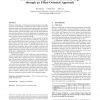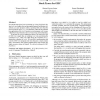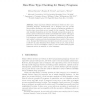180 search results - page 16 / 36 » Locating causes of program failures |
ASPLOS
2010
ACM
14 years 3 months ago
2010
ACM
Multicore technology is making concurrent programs increasingly pervasive. Unfortunately, it is difficult to deliver reliable concurrent programs, because of the huge and non-det...
DSN
2008
IEEE
14 years 3 months ago
2008
IEEE
This paper introduces SymPLFIED, a program-level framework which allows specification of arbitrary error detectors and the verification of their efficacy against hardware errors. ...
HASKELL
2009
ACM
14 years 3 months ago
2009
ACM
Even Haskell programs can occasionally go wrong. Programs calling head on an empty list, and incomplete patterns in function definitions can cause program crashes, reporting littl...
OSDI
2000
ACM
13 years 10 months ago
2000
ACM
Overcast is an application-level multicasting system that can be incrementally deployed using today's Internet infrastructure. These properties stem from Overcast's impl...
CC
2003
Springer
14 years 2 months ago
2003
Springer
Abstract. Many important software systems are written in the C programming language. Unfortunately, the C language does not provide strong safety guarantees, and many common progra...



